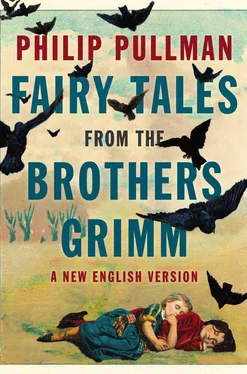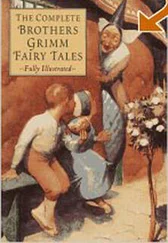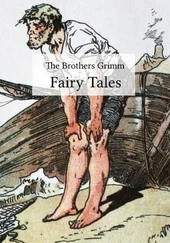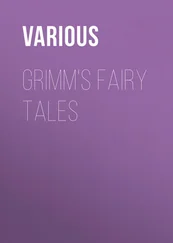Gretel ran straight to the shed and cried: ‘Hansel, we’re safe! The old witch is dead!’
Hansel leaped out, as joyful as a bird that finds its cage open. They were so happy! They threw their arms around each other’s necks, they hugged, they jumped for joy, they kissed each other’s cheeks. There was nothing to fear any more, so they ran into the cottage and looked around. In every corner there were trunks and chests full of precious stones.
‘These are better than pebbles!’ said Hansel, dropping some in his pocket.
‘I’ll take some too,’ said Gretel, and filled her apron with them.
‘And now let’s go,’ said Hansel. ‘Let’s leave these witchy woods behind.’
After walking a few hours, they came to a lake.
‘It’s going to be difficult to get across,’ said Hansel. ‘I can’t see a bridge anywhere.’
‘There aren’t any boats either. But look,’ said Gretel, ‘there’s a white duck. I’ll see if she can help us get across.’
She called out:
‘Little duckling, little duck,
Be kind enough to bring us luck!
The water’s deep and cold and wide,
And we must reach the other side.’
The little duck swam up to them, and Hansel climbed on her back.
‘Come on, Gretel!’ he said. ‘Climb on with me!’
‘No,’ said Gretel, ‘that would be too much of a cargo. We should go one at a time.’
So the good little bird took them one after the other. When they were safely ashore again they walked on further, and soon the forest began to grow more familiar. At last they saw their own home in the distance, and they ran up and rushed inside and threw themselves into their father’s arms.
The man hadn’t had one happy moment since he’d left his children in the forest. Not long after that, his wife had died, and he was all alone, and poorer than ever. But now Gretel unfolded her little apron and shook out all the jewels so that they bounced and scattered all over the room, and Hansel threw handful after handful after them.
So all their troubles were over, and they lived happily ever after.
The mouse has run,
My tale is done —
And if you catch it, you can make yourself a great big furry hat.
* * *
Tale type:ATU 327, ‘Hansel and Gretel’
Source:story told to the Grimm brothers by the Wild family
Similar stories:Alexander Afanasyev: ‘Baba Yaga and the Brave Youth’ ( Russian Fairy Tales ); Giambattista Basile: ‘Ninnillo and Nennella’ ( The Great Fairy Tale Tradition , ed. Jack Zipes); Italo Calvino: ‘Chick’, ‘The Garden Witch’ ( Italian Folktales ); Charles Perrault: ‘Little Thumbling’ ( Perrault’s Complete Fairy Tales )
The best-known tales, of which this is certainly one, have lived on in countless anthologies and picture-books and theatrical adaptations (and, in this case, opera) until familiarity threatens to dull their fine qualities. But this is a great and ferocious classic. The wonderful invention of the edible house, together with the implacable cruelty of the witch and the wit and bravery of Gretel in dealing with her so neatly, make it unforgettable.
Mother, or stepmother? In the Grimms’ first edition, of 1812, the woman is simply ‘the mother’. By the time of the seventh edition of 1857 she had become a stepmother, and so she remains. Marina Warner, in From the Beast to the Blonde , is very interesting on the Grimms’ reasons for this (the only way they could preserve an ideal vision of the Mother was to banish and replace her) and also on Bruno Bettelheim’s Freudian interpretation (the mother/stepmother split allows the listening children to deal guiltlessly with their anger at their own mother’s threatening side). From the storytelling point of view, I go for simplicity.
Jack Zipes, in Why Fairy Tales Stick , points out that underlying this tale, which to many seems a matter of pure fancy, is the unhappy reality of rural poverty and the prospect of real starvation for many families. Desperate times, desperate remedies, no doubt, but shouldn’t the story condemn the father a little more? And the death of the stepmother is very convenient, especially given the association of stepmother and witch that many modern storytellers have built on (including myself). It would have been a sorry ending for the children to come home and find her still ruling the roost. Perhaps the father killed her. If I were writing this tale as a novel, he would have done.
The episode of the duck is a curious little intervention in the story from the Grimms’ final edition. It didn’t exist before that, at least in print, but I think it works, so I’ve included it too. The lake is an impassable barrier between the threatening forest and the safety of home, and a barrier is a desirable thing to have unless you’re on the wrong side of it; but it can be crossed with a combination of the benevolence of nature and human ingenuity.
TEN
THE THREE SNAKE LEAVES
Once there was a poor man who couldn’t support his only son any more. When the son realized this, he said, ‘Father, it’s no use my staying here. I’m just a burden to you. I’m going to leave home and see if I can earn a living.’
The father gave him his blessing, and they parted sorrowfully.
The king of a nearby country was a powerful ruler, and at that time he was waging war. The young man enlisted in his army and soon found himself at the front where a great battle was being fought. The bullets flew like hail, the danger was hideous, and his comrades were falling dead all around. When the general himself fell dead, the last of the troops were going to flee, but the young man took his place and yelled: ‘We won’t be defeated! Follow me, and God save the king!’
The men followed him as he led the charge, and they soon had the enemy on the run. When the king heard of the young man’s part in the victory, he promoted him to field marshal, gave him gold and treasure, and bestowed on him the highest honours in the kingdom.
Now the king had a daughter who was very beautiful, but she had one strange obsession. She had sworn an oath not to marry any man unless he promised to let himself be buried alive with her if she died first. ‘After all, if he really loves me,’ she said, ‘why would he want to go on living?’ And she said that she would do the same and be buried with him if he was the first to die.
This grim condition had put off many young men who would otherwise have begged to marry her, but the soldier was so struck by her beauty that nothing would discourage him. So he asked the king for her hand.
‘Do you know what you must promise?’ said the king.
‘If she dies before me, I must go to the grave with her,’ said the soldier. ‘But I love her so much that I’m willing to risk that.’
The king consented, and the wedding was celebrated with great splendour.
For a while they lived together happily, but one day the princess fell ill. Doctors came from all over the kingdom, but none of them could help her, and presently she died. And then the young soldier remembered the promise he’d had to make, and shuddered. There was no way of getting out of it, even if he’d wanted to break the promise, because the king was going to put sentries at the grave itself and all around the cemetery in case he tried to escape. When the day came for the princess to be buried, they carried her body to the royal vault, made sure the young man was inside, and the king personally locked and bolted the door.
They had put some provisions in there: on a table there were four candles, four loaves of bread and four bottles of wine. The soldier sat there beside the princess’s body day after day, taking only a mouthful of bread and a sip of wine, making them last as long as possible. When he’d taken the last sip but one and eaten the last mouthful but one, and when the last candle was down to its last inch, he knew that his time had nearly come.
Читать дальше












